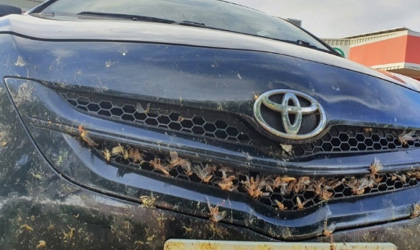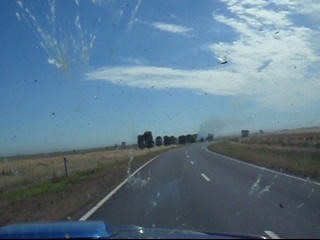Driving safely through a locust swarm
 It’s important to exercise caution when driving through a locust swarm. Locust swarms may reduce your ability to see the road and oncoming traffic and block your vehicle's radiator, causing overheating.
It’s important to exercise caution when driving through a locust swarm. Locust swarms may reduce your ability to see the road and oncoming traffic and block your vehicle's radiator, causing overheating.
To prepare for your trip, you should:
- add some specially formulated insect cleaning agent to the windscreen washer system (available at larger supermarkets, auto accessory outlets and service stations)
- attach an insect screen (not green in colour) to your external radiator air-inlet for extra protection
- pack a bag with spare water and extra insect cleaning agent and cloths, rags and brush.
If you are driving:
- Slow down or stop if visibility reduces — gradually reduce your speed and if safe, continue driving or stop where it is safe to do so.
- If deciding to stop, turn off your engine — to avoid overheating.
- Monitor temperature gauge on your dashboard — dead locusts can reduce air flow to an engine and cause overheating.
- Turn on your headlights — to alert oncoming traffic of your presence.
- Be aware that traffic coming from the opposite direction will also have reduced visibility, so remain alert.
- Remain in your car until the swarm subsides.
- Use your windscreen wipers to clear locusts from your windscreen — well-fed locusts leave a residue of body parts and fat at the point of impact.
- When visibility improves, apply water and insect cleaning agent and use cloths or rags to remove locust residue from windscreen, wipers headlights and radiator air-inlet.
Page last updated: 30 Dec 2020